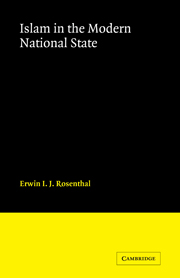Book contents
- Frontmatter
- Contents
- Introduction
- Acknowledgements
- Abbreviations
- Note on transliteration
- PART I CONTEMPORARY ISLAM IN CRISIS AND TRANSITION
- SECTION 1
- SECTION 2 ISLAMIC OR MODERN NATIONAL STATE?
- 3 Islam and Turkish Nationalism
- 4 For and against the Khilāfa
- 5 Islam and Arab Nationalism
- 6 An Islamic State for Pakistan?
- 7 Ἁllāl al-Fāsī: a Blend of Islam and Arab Nationalism
- PART II ISLAM IN THE MODERN NATIONAL STATE
- Epilogue
- Notes
- Select Bibliography
- Index
3 - Islam and Turkish Nationalism
Published online by Cambridge University Press: 05 September 2013
- Frontmatter
- Contents
- Introduction
- Acknowledgements
- Abbreviations
- Note on transliteration
- PART I CONTEMPORARY ISLAM IN CRISIS AND TRANSITION
- SECTION 1
- SECTION 2 ISLAMIC OR MODERN NATIONAL STATE?
- 3 Islam and Turkish Nationalism
- 4 For and against the Khilāfa
- 5 Islam and Arab Nationalism
- 6 An Islamic State for Pakistan?
- 7 Ἁllāl al-Fāsī: a Blend of Islam and Arab Nationalism
- PART II ISLAM IN THE MODERN NATIONAL STATE
- Epilogue
- Notes
- Select Bibliography
- Index
Summary
In retrospect we might say that modern developments, culminating in the predominance of the human element and the separation of religion and politics, are adumbrated in Ibn Khaldūn's crucial distinction between the divine and the human in politics. For him there is no nostalgia for the golden age of the past; his is the recognition of historical continuity and change. His political realism is born of psychological insight into the working of political institutions, created by man for man.
His thoughts were far in advance of his time, and centuries passed before an interest was taken in his summa of civilisation. While he may have influenced modern thinkers of the Muslim world, he did not father their ideas about Islam in an age of rationalism and nationalism, nor their ideas about state and society. But his ideas are relevant for present-day Muslims who have to determine what part Islam is to play in the public life of their modern states. At least this is my opinion, especially in the field of legislation. This will emerge when we now briefly survey the constitutional and legal problems that Muslim states have to face in our time.
RELIGIOUS CONSERVATISM AND POLITICAL LIBERALISM
We begin with the Young Ottomans and their reactions to the Tanzimat from the point of view of the Sharī‘a of Islam, and we then proceed to the Young Turks.
- Type
- Chapter
- Information
- Islam in the Modern National State , pp. 28 - 63Publisher: Cambridge University PressPrint publication year: 1965



